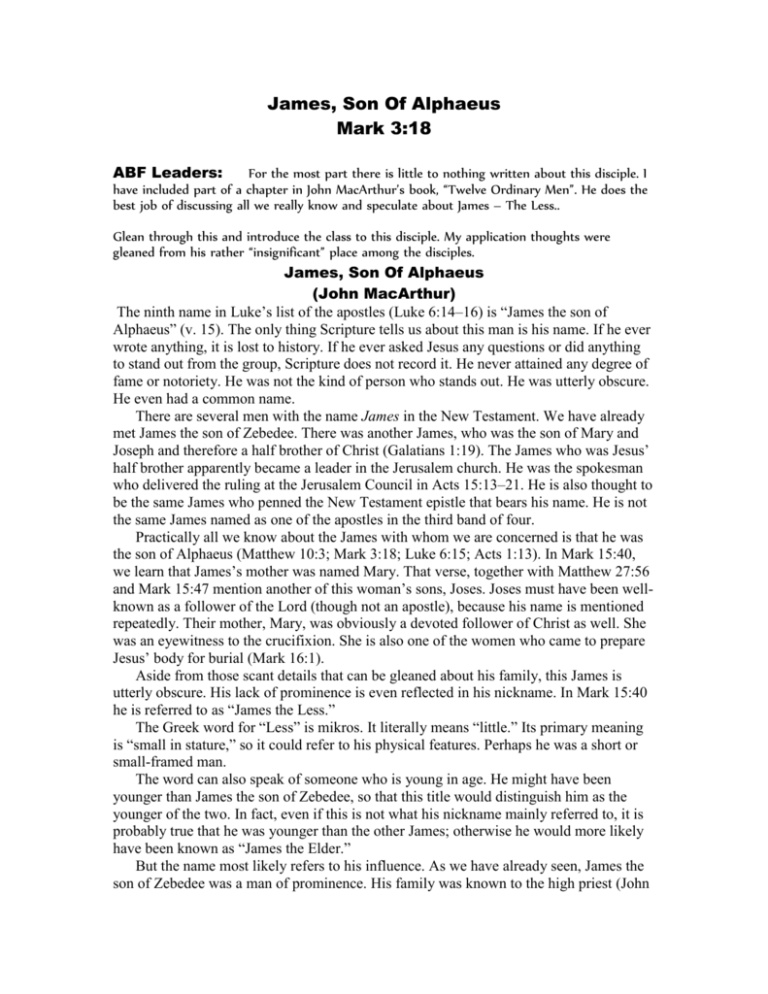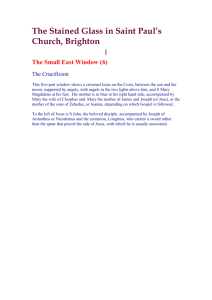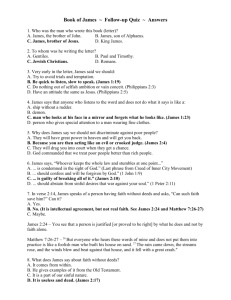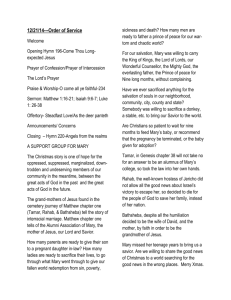James, Son of Alphaeus: A Lesson on Obscurity & Significance
advertisement

James, Son Of Alphaeus Mark 3:18 ABF Leaders: For the most part there is little to nothing written about this disciple. I have included part of a chapter in John MacArthur’s book, “Twelve Ordinary Men”. He does the best job of discussing all we really know and speculate about James – The Less.. Glean through this and introduce the class to this disciple. My application thoughts were gleaned from his rather “insignificant” place among the disciples. James, Son Of Alphaeus (John MacArthur) The ninth name in Luke’s list of the apostles (Luke 6:14–16) is “James the son of Alphaeus” (v. 15). The only thing Scripture tells us about this man is his name. If he ever wrote anything, it is lost to history. If he ever asked Jesus any questions or did anything to stand out from the group, Scripture does not record it. He never attained any degree of fame or notoriety. He was not the kind of person who stands out. He was utterly obscure. He even had a common name. There are several men with the name James in the New Testament. We have already met James the son of Zebedee. There was another James, who was the son of Mary and Joseph and therefore a half brother of Christ (Galatians 1:19). The James who was Jesus’ half brother apparently became a leader in the Jerusalem church. He was the spokesman who delivered the ruling at the Jerusalem Council in Acts 15:13–21. He is also thought to be the same James who penned the New Testament epistle that bears his name. He is not the same James named as one of the apostles in the third band of four. Practically all we know about the James with whom we are concerned is that he was the son of Alphaeus (Matthew 10:3; Mark 3:18; Luke 6:15; Acts 1:13). In Mark 15:40, we learn that James’s mother was named Mary. That verse, together with Matthew 27:56 and Mark 15:47 mention another of this woman’s sons, Joses. Joses must have been wellknown as a follower of the Lord (though not an apostle), because his name is mentioned repeatedly. Their mother, Mary, was obviously a devoted follower of Christ as well. She was an eyewitness to the crucifixion. She is also one of the women who came to prepare Jesus’ body for burial (Mark 16:1). Aside from those scant details that can be gleaned about his family, this James is utterly obscure. His lack of prominence is even reflected in his nickname. In Mark 15:40 he is referred to as “James the Less.” The Greek word for “Less” is mikros. It literally means “little.” Its primary meaning is “small in stature,” so it could refer to his physical features. Perhaps he was a short or small-framed man. The word can also speak of someone who is young in age. He might have been younger than James the son of Zebedee, so that this title would distinguish him as the younger of the two. In fact, even if this is not what his nickname mainly referred to, it is probably true that he was younger than the other James; otherwise he would more likely have been known as “James the Elder.” But the name most likely refers to his influence. As we have already seen, James the son of Zebedee was a man of prominence. His family was known to the high priest (John 18:15–16). He was part of the Lord’s most intimate inner circle. He was the better-known of the two Jameses. Therefore, James the son of Alphaeus was known as “James the Less.” Mikros. “Little James.” It may well be that all these things were true of James, so that he was a small, young, quiet person who stayed mostly in the background. That would all be consistent with the low profile he had among the Twelve. We might say his distinguishing mark was his obscurity. That in itself is a significant fact. Apparently he sought no recognition. He displayed no great leadership. He asked no critical questions. He demonstrated no unusual insight. Only his name remains, while his life and his labors are immersed in obscurity. But he was one of the Twelve. The Lord selected him for a reason, trained and empowered him like the others, and sent him out as a witness. He reminds me of those unnamed people mentioned in Hebrews 11:33–38: … who through faith subdued kingdoms, worked righteousness, obtained promises, stopped the mouths of lions, quenched the violence of fire, escaped the edge of the sword, out of weakness were made strong, became valiant in battle, turned to flight the armies of the aliens. Women received their dead raised to life again. And others were tortured, not accepting deliverance, that they might obtain a better resurrection. Still others had trial of mockings and scourgings, yes, and of chains and imprisonment. They were stoned, they were sawn in two, were tempted, were slain with the sword. They wandered about in sheepskins and goatskins, being destitute, afflicted, tormented; of whom the world was not worthy. They wandered in deserts and mountains, in dens and caves of the earth. Eternity will reveal the names and the testimonies of these, like James the Less, whom this world barely remembers and knows nothing about. Early church history is also mostly silent about this man named James. Some of the earliest legends about him confuse him with James the brother of the Lord. There is some evidence that James the Less took the gospel to Syria and Persia. Accounts of his death differ. Some say he was stoned; others say he was beaten to death; still others say he was crucified like his Lord. In any case, we can be certain that he became a powerful preacher like the others. He surely performed “the signs of an apostle … in signs and wonders and mighty deeds” (2 Corinthians 12:12). And His name will be inscribed on one of the gates of the heavenly city. Here’s an interesting thought about James, son of Alphaeus: You may recall that according to Mark 2:14, Levi (Matthew) was the son of a man named Alphaeus as well. It could be that this James was the brother of Matthew. After all, Peter and Andrew were brothers and James and John were brothers. Why not these two? There is no effort on the part of Scripture to distinguish between the two Alphaeuses. On the other hand, Matthew and James are nowhere identified as brothers. We simply don’t know whether they were or not. Another interesting question about James’s lineage comes to light when we compare Mark 15:40 with John 19:25. Both verses mention two other Marys who were standing by the cross of Jesus with Mary the Lord’s mother. Mark 15:40 mentions “Mary Magdalene, and Mary the mother of James the less and of Joses.” John 19:25 names “[Jesus’] mother’s sister, Mary the wife of Clopas, and Mary Magdalene.” It is possible, perhaps even likely, that Jesus’ mother’s sister (“Mary the wife of Clopas”) and “Mary the mother of James the less” are the same person. (“Clopas” may have been another name for Alphaeus, or James’s mother might have remarried after his father died). That would have made James the Less Jesus’ cousin. Was James the cousin of our Lord? Was he the brother of Matthew? We don’t know. Scripture doesn’t expressly tell us. The disciples’ importance did not stem from their pedigree. Had that been important, Scripture would have recorded it for us. What made these men important was the Lord whom they served and the message they proclaimed. If we lack details about the men themselves, that is OK. Heaven will reveal the full truth of who they were and what they were like. In the meantime, it is enough to know that they were chosen by the Lord, empowered by the Spirit, and used by God to carry the gospel to the world of their day. All the men themselves more or less disappear from the biblical narrative within a few years after Pentecost. In no case does Scripture give us a full biography. That is because Scripture always keeps the focus on the power of Christ and the power of the Word, not the men who were merely instruments of that power. These men were filled with the Spirit and they preached the Word. That is all we really need to know. The vessel is not the issue; the Master is. No one epitomizes that truth better than James the Less, son of Alphaeus. He may have been able to claim that he was Matthew’s brother or Jesus’ cousin, but he went quietly unnoticed through the entire Gospel narrative. This world remembers next to nothing about him. But in eternity, he will receive a full reward (Mark 10:29–31).1 DISCUSSION TIME: With that description, I am reminded of the verse found in I Samuel 16:7 referring to the time Samuel was looking for the next king over Israel. We read, “But the Lord said Samuel, Do not look at his appearance or the height of his stature; because I have rejected him: for God sees not as man sees: for man looks on the outward appearance, but the Lord looks at the heart.” According to I Samuel 16:7: 1. What seems to be God’s way in choosing someone for a ministry position? 2. What particular area of our life does God seem to be interested in above all else? Why? A good cross reference passage is Isaiah 55:8-11.. “God’s ways are not our ways”. As I think of I Samuel 16:7, and Isaiah 55:8-11 I think of the many paradoxes I find between the Bible and the World. 1 MacArthur, J. (2002). Twelve ordinary men : How the Master shaped his disciples for greatness, and what He wants to do with you (167–174). Nashville, TN: W Pub. Group. The World says: My significance is found in what I Achieve / Accomplish. The Bible says: Matthew 10:37-39 Matthew 19:30 3. What does this paradox in verse 39 say to you? 4. How can you “lose your life” for Christ this week? The World says: My significance is found in what I have / my possessions.. The Bible says: Luke 6:38 Acts 20:35 5. Can you honestly say you agree 100% with what Jesus said in Acts 20:35? 6. In what ways have you found Acts 20:35 to be accurate in your life? Or, in your church experience? The World says: My significance is found in elevating myself. The Bible says: Matthew 23:12 James 4:10 / I Peter 5:5-6 7. Humility is our inward submission to God. What are some outward signs of our inward submission to God? 8. James 4:10 & I Peter 5:5-6 command us to “humble ourselves”. How do go about the process of “humbling ourselves”? The World says: My significance is found in leading not serving. In control rather than being controlled. The Bible says: Mark 10:42-45 Matthew 19:30 One of the struggles we have is living by one set of rules in the world’s system and then by another in the church of Jesus Christ. Authority is exercised one way in the world (where you work) and another way in church (where you worship). 9. What are some ways we have yet to get this right in the church? 10. What are some ways we have gotten it right in the church? 11. Do you see this principle at work in NCC? It is always easy to see how others ought to be living this out. 12. How would the Lord want you to become more of a servant at NCC – from the heart? The life of James the Less could not be better summed up than in the works of John the Baptist is John 3:30, “He must increase, I must decrease.” Contrary to the world’s way of thinking, Our significance is in becoming less for the glory of God, not more in the eyes of the world. 13. In what ways do you think God asks us to decrease in order for Him to increase? In our lives, and in the estimation of others who see our lives?









